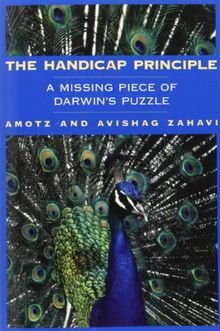
Ever since Darwin, animal behavior has intrigued and perplexed human observers. The elaborate mating rituals, lavish decorative displays, complex songs, calls, dances and many other forms of animal signaling raise fascinating questions. To what degree can animals communicate within their own
species and even between species? What evolutionary purpose do such communications serve? Perhaps most importantly, what can animal signaling tell us about our own non-verbal forms of communication? In The Handicap Principle, Amotz and Ashivag Zahavi offer a unifying theory that brilliantly
explains many previously baffling aspects of animal signaling and holds up a mirror in which ordinary human behaviors take on surprising new significance.
The wide-ranging implications of the Zahavis' new theory make it arguably the most important advance in animal behavior in decades. Based on 20 years of painstaking observation, the Handicap Principle illuminates an astonishing variety of signaling behaviors in animals ranging from ants and ameba
to peacocks and gazelles. Essentially, the theory asserts that for animal signals to be effective they must be reliable, and to be reliable they must impose a cost, or handicap, on the signaler. When a gazelle sights a wolf, for instance, and jumps high into the air several times before fleeing,
it is signaling, in a reliable way, that it is in tip-top condition, easily able to outrun the wolf. (A human parallel occurs in children's games of tag, where faster children will often taunt their pursuer before running). By momentarily handicapping itself--expending precious time and energy in
this display--the gazelle underscores the truthfulness of itssignal. Such signaling, the authors suggest, serves the interests of both predator and prey, sparing each the exhaustion of a pointless chase. Similarly, the enormous cost a peacock incurs by carrying its elaborate and weighty
tail-feathers, which interfere with food gat